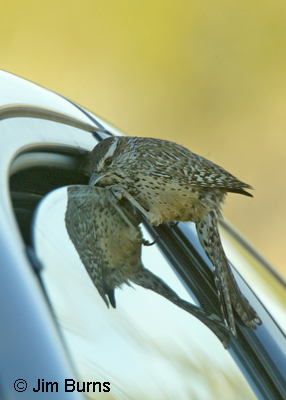
PROTEIN DIET
You're sweeping the patio and notice a small, translucent wing, lying there by itself. Or maybe a diminutive leg, replete with miniature spurs and a hinged foot. These are the tiny gems that first awoke your awe of nature as a child. But where are the bodies?
Insectivorous birds cannot swallow and digest the hard exoskeleton of the bugs they catch. Watch what happens next time you see your local grackle, mockingbird, or wren catch a large insect. They'll either pick it and flip it, beat it against the ground, or hold it down with one foot and pull with their bill to separate out the soft parts, the protein.
CONSTANT GARDENER
You're working in your yard and discover several small excavations along a wall or between the sections of the sidewalk. Or maybe a shallow depression under the bushes where the leaf litter has been cleared away. Who's doing this?
Curve-billed thrashers have long, decurved bills for a reason. Watch them at work, digging assiduously in one spot as they excavate for beetles and ants. Abert's towhees use a different technique called a "double scratch," raking their feet back and then quickly forward again in the same spot, picking up the grubs and insects they uncover.
WHITE FLASH
You're watching your local mockingbird work your yard, "flutter-hopping" along the margins of shade, quickly half spreading then folding its wings like a drunken sailor trying to keep his balance. Has it been into some fermented berries?
Notice its large white patches when the mocker flies. It flashes these to flush insects lying motionless and camouflaged on the ground. Many birds hunt in this manner--roadrunners (lizards in the desert), reddish egrets (small fish in shallow salt water), and painted redstarts (insects in Arizona's mountain canyons) are just a few.
HIGHWAY PATROL
You're driving down the highway at first light. Two large, dark birds are flying directly over the road, keeping just ahead of you. Curious, you speed up and they peel off but return to the road behind you. What's up with that?
They're ravens, part of nature's cleanup crew, patrolling for road kill. Ravens are always out at first light looking for critters killed along the highway the previous night when they froze in the headlights.
AUTO DETAILING
You're parking your car in the lot at the Arizona Sonoran Desert Museum in Tucson and notice several bees and butterflies scrunched on the windshield and grill on the drive from Phoenix. When you come back for lunch they're gone? Does ASDM security do auto detailing?
Cactus wrens are notorious for detailing wiper blades, bumpers, and grills. Next time you go down to the ASDM, sit in your car for a few minutes and enjoy the show. It's as entertaining as anything inside the museum. If you leave the windows cracked for the heat, be sure to put your lunch in the trunk. Wrens are curious and their bodies have evolved to fit into very small openings.
Birds are opportunists. Birds learn. Be patient and watch and so will you.